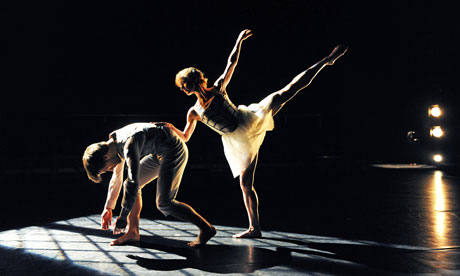In Greek myth Phaedra is the wife of Theseus, who falls in love with her stepson, Hippolytus, and when he rejects her advances, falsely claims that he has raped her – an accusation that will lead to both of their deaths. As last Wednesday's premiere of Richard Alston's new dance work Phaedra demonstrated, it's a tale with very contemporary resonances, and a fascinating reminder of the way that art creates pathways through history.
The myth of Phaedra was made into plays by the Greek tragic poet Euripides and the Roman author Seneca, and these works inspired Jean Racine's 17th-century play Phèdre. To the myth's classic themes Racine brought language of a sublime musicality. Her desire for Hippolytus, Phaedra says, is not merely an emotion, but "Venus entière, attachée à sa proie" (Venus herself, fastened to her prey), a fabulously morbid, vampiric image. Racine's play was translated by the American poet Robert Lowell, and Lowell's version formed the basis of the libretto for Benjamin Britten's cantata Phaedra, which was first performed at the Aldeburgh festival in 1976.
In his choreographed version, in which the title role is sung by the mezzo-soprano Allison Cook, and all the other parts taken by dancers of his company, Alston honours Britten's formal vision. But he also adds grace notes of his own. Hippolytus is danced with stern nobility by Ihsaan de Banya, his upright carriage and austere movement style both reflecting the vow of chastity that he has made to the goddess Artemis, and serving as a telling contrast to Cook's anguished, unanchored delivery.
All versions of Phaedra have at their heart an inflexible principle: that abnegation of moral responsibility leads to catastrophe. Alston presents this lesson dutifully enough, but his choreography suggests that part of him protests against it. As Cook's Phaedra sings, her servant and confidante Oenone (Nancy Nerantzi) leaps and whirls in an ecstasy of concern. She gets Alston's airiest steps, and seems to serve not only as a kind of dancing alter ego to Cook, but as an agent of subversion. In this, I suspect, Alston is taking his lead from Britten. Compositionally, Phaedra is a traditional baroque cantata, but within its formal constraints Britten has planted subtle dissident seeds. Or is this my imagination?
Phaedra is one of a quadruple bill of Alston works set to Britten, and part of the Barbican's two-week celebration of the composer's centenary. The evening opens with Lachrymae, a pensive work for three couples in which Oihana Vesga Bujan is an eloquent presence, and Hölderlin Fragments, a freewheeling, lyrical piece rendered less enjoyable by unsympathetic costuming by Fotini Dimou. No man should have to take the stage in form-fitting baby-blue shorts.
The concluding work is Illuminations, which describes the ill-fated love of the French poets Arthur Rimbaud and Paul Verlaine. The pair are portrayed by Liam Riddick as an intense, self-devouring Rimbaud and Nathan Goodman as a distracted and not-quite-believable Verlaine. Around them, helter-skelter, swirl the other seven members of the company, and this time Dimou comes up trumps with beautifully fitted white gowns, shifts and pyjamas. "I have stretched ropes from bell tower to bell tower; garlands from window to window; gold chains from star to star and I dance," wrote Rimbaud. Alston gives us the dance, but doesn't communicate the violently obsessive nature of the central relationship. His choreography is too formal, and too encoded. This serves him well in Phaedra, but myth and history are not the same thing.








